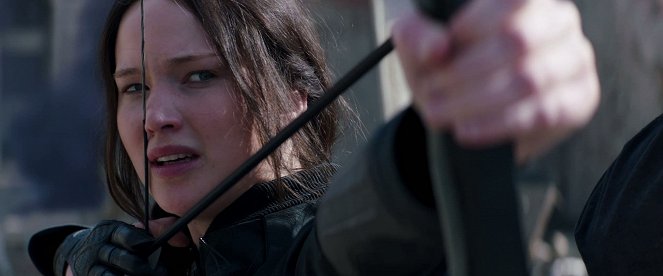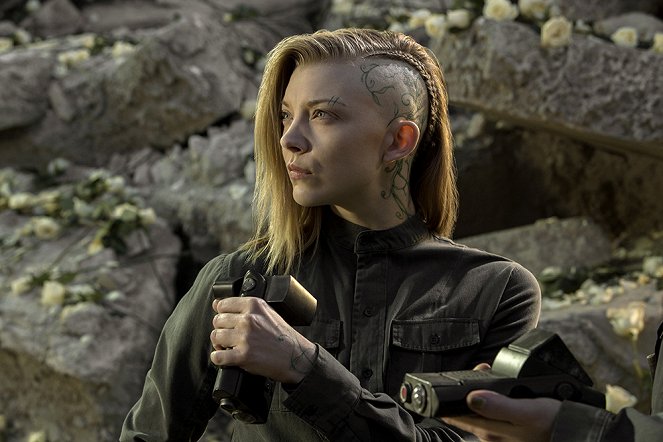Reżyseria:
Francis LawrenceZdjęcia:
Jo WillemsMuzyka:
James Newton HowardObsada:
Jennifer Lawrence, Josh Hutcherson, Liam Hemsworth, Woody Harrelson, Elizabeth Banks, Julianne Moore, Philip Seymour Hoffman, Stanley Tucci (więcej)Opisy(1)
Katniss Everdeen (Jennifer Lawrence) trafia do Dystryktu 13 po tym, jak raz na zawsze położyła kres Głodowym Igrzyskom. Wbrew kłamliwej propagandzie, rebelianci przetrwali zemstę Kapitolu. Pod przewodnictwem pani prezydent Coin (Julianne Moore) przygotowują się do rozprawy z dyktatorską władzą. Katniss, mimo początkowych wahań, zgadza się wziąć udział w walce. Czy odnajdzie się w roli przywódczyni? Czy stanie się Kosogłosem, symbolem nadziei i oporu przeciw tyranii prezydenta Snowa? (Monolith)
(więcej)Materiały wideo (28)
Recenzje (12)
It's not smarter than the previous parts in the series, just more talkative. It's not even fun. The story has disappeared, and the development of Katniss and Peeta's relationship, which held the first and second parts above water, is sidelined. I've never been a fan of Panem's world, and I really don't have anything to lean on here. Overall impression: 25%. It seems to me that the whole series mentally corresponds to the world of 12-16-year-old teenagers, and it is questionable whether this stretched filler can satisfy them...
()
“Order shall be restored.” The next to last instalment of The Hunger Games is perhaps not the most elegant example of Hollywood storytelling – in the end, the whole film is an unfulfilled promise of something tremendous – but in terms of media self-reflection, it offers enough impetus to keep you thinking for many days after seeing it. Haunted by nightmares, Katniss gains inner peace not by finding a kindred spirit and actively taking control of the situation, but by accepting the media role that has been created for her. Using dresses, computer effects and fighting words, she transforms into an effective tool of revolution, a player in an artificially constructed reality, which she herself gradually stops perceiving as something alien, separate from the real world. She gradually accepts her role and the vocabulary of her creators and adapts her behaviour to the (omni)present camera and the interests of the revolution (“Don't shoot here. I can't help them”). Her position as a mere symbolic object is clear from the situations in which she passively finds herself and from the way the other characters relate to her (even in her presence, they speak of her in the third person and are primarily concerned with making her look good in promotional videos). Playing on emotions, the narrative is tailored to her spontaneous decisions, essentially making it impossible for her to exit the story. What she doesn’t realise is that her story mirrors that of Peeta, that she herself has become a cat dully chasing the light (perhaps a needlessly conspicuous metaphor, but also a quite clear indication that it is a mistake to approach the film as a standard genre flick). The making of the rebel and the selling of the revolution happens in parallel on two levels (in-text and outside of the text) and it’s as if the film gives us a look behind the scenes of its own creation. After a gripping action scene in an otherwise unusually unspectacular, slow and disturbingly quiet film, the same shots of the attack on the rebel hospital are repositioned in the context of a propagandistic “weekly” whose purpose is to manipulate the masses, just as we were manipulated (captivated by the spectacle) a moment before. The camera “journalistically” follows Katniss even in scenes where she is not filmed in the diegetic space. The blending of shooting styles leads to the further blurring of the line between propaganda for the people of Panem and for us. We can thus see the film’s ending, warning against the authentic with the artificially produced television broadcast intended to cover up what is happening in reality in the meantime, as the ultimate act of insincerity perpetrated by an industry built on a similar distortion of reality, or accept it as an ingenious rebellion carried out within the confines of a major-studio Hollywood narrative. However, the filmmakers could not have taken the liberty of launching a rebellion if it didn’t involve an adaptation of a bestseller capitalising on the demand for stories of defiance against the old order and whose multimillion-dollar box-office receipts are guaranteed in advance. 80%
()
(mniej)
(więcej)
Both the The Hunger Games and The Hunger Games: Catching Fire were, in terms of adaptation for young adults, fantastic and perfectly escalating, but for me they simply couldn't match the quality of the source material. Although in the case of the latter, it was a close call. It is precisely because of this that I was more afraid of them splitting the finale, as its political intrigues and gradual war tactics were by far the weakest (and yet quite numerous) passages in the book. But fate and the producers presented the established creative team with two newcomers, the screenwriting duo of Danny Strong and Peter Craig. It's hard to say how these two came together and what led them to The Hunger Games, but it was a decision that definitively shifts the entire saga into self-sufficient territory. With enough time and emotions, all of which hit the right marks thanks to Jennifer Lawrence's unwavering and, on the contrary, growing acting talents. From the first The Hunger Games: Mockingjay, a constantly suspenseful spectacle has emerged, which despite its apparent aimlessness never loses momentum for a moment, and it offers its share of unforgettable moments (Katniss's song, the rose, the final twist). Now Lawrence and company have nothing to prove, because they handled the most critical moment with shocking finesse and have in front of them the even more treacherous task of adapting the pure gold that is the second half. And yes, I am just as anxious as I am excited.
()
I was going into the third Hunger Games movie with respect. I might have even been a little bit afraid. The first one had a premise that was really enjoyable. The second one had a combination of an arena fighting and politics, which enthused me far less, and after watching it, it was clear that the third one would be pure war and politics, which is something I was afraid of. But in the end, it wasn’t that bad. There was politics, but it was bearable. An array of amazing action scenes often came to the rescue, as well as the actors who obviously enjoyed it immensely. Especially Moore and Hoffman whose roles I’ll never forget. I must even admit that even though this movie had a lot of flaws, I’m excited to see the final instalment.
()
The first Mockingjay is one of the most typical blockbusters in the history of Hollywood. The second most commercially successful film in the Unites States in 2014 and the fifth in the given year in worldwide box-office revenues is completely devoid of money shots, epic scenes and bombastic action sequences. Its two-hour runtime predominantly comprises dialogue scenes, as most of the film takes place in an underground bunker and all of the characters wear baggy coveralls. Here the filmmakers can afford to do what would be commercial suicide anywhere else thanks to the fact that this is a feature-length exposition for the climax, which will come in the second film. The knowledge that, thanks to its title, the film will automatically be a hit regardless of what happens in it gave rise to the film saga’s crucial episode. Instead of a seasonal spectacle, we have here a film that appeals exclusively to adolescent audiences, but instead of the formulaicness and superficiality that is associated with this target group on the part of overly clever old people and pragmatic producers, it relates a narrative from an Orwellian grey world that uncovers deceit and media manipulation, showing the heroine fumbling her way between her own interests and the intentions of others, while offering no resolution of the conflicts that have arisen.
()


